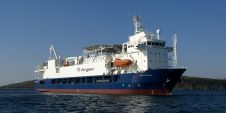Restoring Reliability of Official Publications
I work for the Japan Hydrographic Association (JHA). As some of you may know, I spent most of my career with the Hydrographic Office of Japan. The organisation that I work for is under the supervision of the government with the condition of not pursuing profit.
The organisation distributes official nautical publications of the Japanese government. As some countries are experiencing, private sectors are now growing and have stronger powers in this field. In the long term, government and private sectors are supposed to have a co-operative partnership, but in the short term it seems that they are even competing with each other.
Recently I had the opportunity to hear reports from seafarers in large Japanese shipping companies about the usefulness of the official ENCs. Their opinions were rather harsh, pointing out several defects of the intergovernmental system. For example, there is no one-stop shopping, the gaps between cells of different countries are still not filled, etc. These problems are already well recognised in the hydrographic community. One of the things I want to stress here is that they seem not to place their trust in official publications as they did in the past. They make a comparison between official publications and private sector publications. The reasons why official publications exist are their reliability and being official, I believe. I prefer not to imagine the worst case. However, a recent tendency in the government (as in the rest of the world?) is to broaden the discretion of private sectors. If official publications begin to lose their reliability, something unwelcome might happen to support the above tendency. I hope my imagination proves to be just a nightmare.
I have been very much involved with the reformation of the IHO through the work of the IHO Strategic Planning Working Group (SPWG). There were many issues on the table: speeding up decision making, encouraging more participation by private sectors, promoting capacity building, etc. As all of you know, a new convention has been admitted in the last International Hydrographic Conference and it is now in the ratification process. However, under an unavoidable constraint of the intergovernmental system, progress seems to be slow.
Recently, the JHA had a chance to help with the launch of ‘official’ Malacca and Singapore Strait ENCs onto the market. Hopefully, the ENCs will be officially published by the joint efforts of three littoral countries (Indonesia, Malaysia, Singapore) at the end of this year. This strait is quite congested with vessel traffic and is one of the most important straits for the international maritime community. The project of publishing official ENCs of this strait was conceived and initiated a long time ago between three littoral countries, namely Indonesia, Malaysia and Singapore, with the help of Japan. However, it took quite long to reach the final objective of publication. My organisation is very proud to be able to participate in the final stage of this important project. With only six cells included, this project is quite small, but it is a large step forward. JHA aims to maintain the reliability of official ENCs and to ‘restore’ it, if this is necessary.

Value staying current with hydrography?
Stay on the map with our expertly curated newsletters.
We provide educational insights, industry updates, and inspiring stories from the world of hydrography to help you learn, grow, and navigate your field with confidence. Don't miss out - subscribe today and ensure you're always informed, educated, and inspired by the latest in hydrographic technology and research.
Choose your newsletter(s)
























